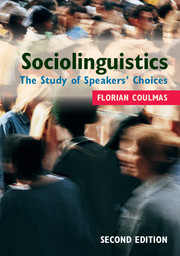Book contents
- Frontmatter
- Contents
- List of figures
- List of tables
- Preface to the second edition
- 1 Introduction: notions of language
- Part I Micro-choices
- Part II Macro-choices
- 7 Code-switching: linguistic choices across language boundaries
- 8 Diglossia and bilingualism: functional restrictions on language choice
- 9 Language spread, shift and maintenance: how groups choose their language
- 10 Language and identity: individual, social, national
- 11 Language planning: communication demands, public choice, utility
- 12 Select letters: a major divide
- 13 The language of choice
- 14 Research ethics
- Glossary of terms
- References
- Index
- References
13 - The language of choice
Published online by Cambridge University Press: 05 August 2013
- Frontmatter
- Contents
- List of figures
- List of tables
- Preface to the second edition
- 1 Introduction: notions of language
- Part I Micro-choices
- Part II Macro-choices
- 7 Code-switching: linguistic choices across language boundaries
- 8 Diglossia and bilingualism: functional restrictions on language choice
- 9 Language spread, shift and maintenance: how groups choose their language
- 10 Language and identity: individual, social, national
- 11 Language planning: communication demands, public choice, utility
- 12 Select letters: a major divide
- 13 The language of choice
- 14 Research ethics
- Glossary of terms
- References
- Index
- References
Summary
English is destined to be in the next and succeeding centuries more generally the language of the world than Latin was in the last or French is in the present age.
John Adams (1780)Our most dangerous foe is the foreign-language press.
Theodore Roosevelt (1917)Adewale is known to me as an editor for the Heinemann African Writers series, Africa correspondent for Index on Censorship and a fellow Nigerian Englishman (though his English is Scots and mine Irish). A difference that fascinates: he was brought up in Lagos, I’m from London.
Gabriel Gbadamosi (1999: 187)Outline of the chapter
In the preceding chapters, we have examined choices concerning linguistic units, styles, discourse patterns and sociolinguistic arrangements. This chapter turns to language choice in a global setting, examining the role of English in the world today. It recapitulates some of the conditions that made English an international language and discusses arguments that welcome and criticize this development. From a sociolinguistic point of view, global language dispersion calls for a unified explanation. Two theoretical models are introduced, one borrowing the concept of biodiversity and its reduction from biology, the other conceiving of the world’s languages as a market place by way of referring to economics. Both approaches seek to explain how the spread of English affects other languages. The many ways in which English itself is influenced by coming into contact with other languages and being used in many different cultural settings are dealt with in the last section of the chapter.
- Type
- Chapter
- Information
- SociolinguisticsThe Study of Speakers' Choices, pp. 244 - 260Publisher: Cambridge University PressPrint publication year: 2013



